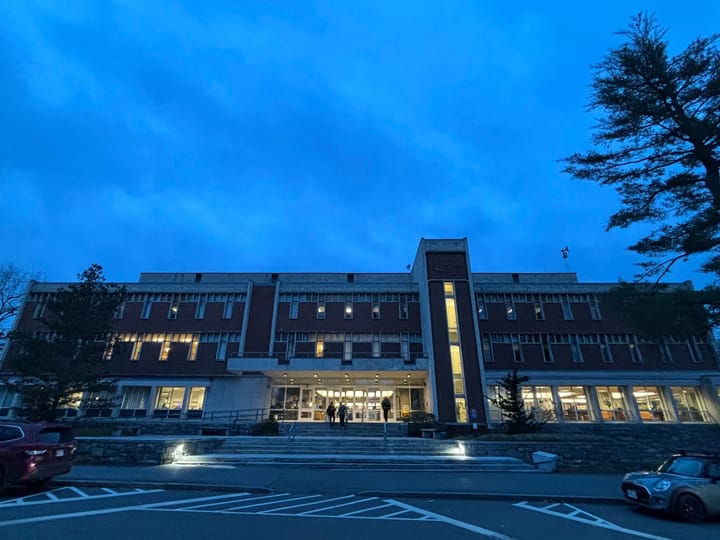Food Systems Committee Works to Improve Dining
The Student spoke with members of the Amherst Food Systems Committee to learn about how they are improving the quality and sustainability of dining on campus. The committee is currently working on a Sustainable Food Plan, which will outline the future of Amherst dining policies.

A group of students and staff sit in a conference room, mulling over a pie chart depicting the expenditures of Amherst Dining Services. They might not look like it, but they’re writing a manifesto calling for a transformation of dining at Amherst.
Formed in 2022, the Amherst Food Systems Committee is aimed at improving the quality and sustainability of dining on campus. Using data compiled by a dining fellow last year, the committee is now working to develop a Sustainable Food Plan, which will outline the future of Amherst dining. To understand the work of the Food Systems Committee and to learn about a recent initiative to increase transparency in Valentine Dining Hall, The Student spoke with the Office of Sustainability’s Food Systems Fellow Dylan Byrne ’24 and Green Dean Anna Hogarth ’23.
Both sit on the Food Systems Committee, a body that was established in 2022 by Parker Richardson ’22, the Food Systems Fellow for that spring. The committee got fully up and running last year, and, meeting biweekly, brought together Joe Flueckiger (the former director of dining services), Executive Sous Chef Bill Fett, Hogarth (then food systems fellow), Willoughby Carlo (the former green dean), some student representatives from student organizations such as the Veggie Club and the Food Justice Alliance, and some Association of Amherst Students representatives. They spent most of these meetings discussing purchasing data compiled and categorized (meat vs. plant based, organic vs. inorganic, local vs. imported, etc.) by interns in the Office of Sustainability.
This year, they’re working on turning that data into a Sustainable Food Plan. This document, which they are aiming to have a finished draft of by the end of the year, will serve as, in Byrne’s words, “a framework for what we want our campus food system to look like.” Some central tenets of their plan will include providing healthier food, reducing climate impact and food waste, and supporting the local economy. In an effort to keep meetings concise while also ensuring time to speak for every participant, Hogarth and Byrne have condensed the committee to include themselves, three dining services representatives, and two other student representatives, one from Book & Plow Farm and the other from the Food Justice Alliance. However, they emphasized the fact that they are looking for student input, and have created a form for students to submit suggestions.
Byrne is a senior and Hogarth is holding a one-year postgraduate position, so neither will be at Amherst to see the long-term influence of the Food Systems Committee. Still, both have a great deal of optimism for what they can accomplish this year, in part due to the unique structure of the college’s dining division. Most colleges and universities are reliant on third-party food contractors, outside corporations that take charge of meal-planning, food purchasing, and staffing. Negotiating better practices with those corporations can be extremely difficult.
“You go to the company, and you say, ‘Hey, can we be more sustainable?’” Byrne said, laughing, “and then the company goes, ‘We’ll think about it.’ They don’t think about it.”
Amherst Dining Services, on the other hand, is not beholden to such a corporation, so change is easier to enact. Thus, the director of Dining Services, a position that has been absent since the departure of Flueckiger in October, holds a large degree of influence over the sustainability of campus dining. With that in mind, Hogarth and Byrne are hoping to use this vacancy as, in Hogarth’s words, an “opportunity to craft some language and urgency around hiring someone new who’s committed to sustainability.” Byrne added that “even just a push to get the word sustainability in the job description would go a long way in that it would attract people who are already focused on that kind of stuff to apply to the position.”
“The hope is that we can do a whole bunch of work on the sustainable food plan. And then when somebody comes to fill the role, we hand it to them and say check this over and hopefully it’s an easy layup for them,” he said.





Comments ()